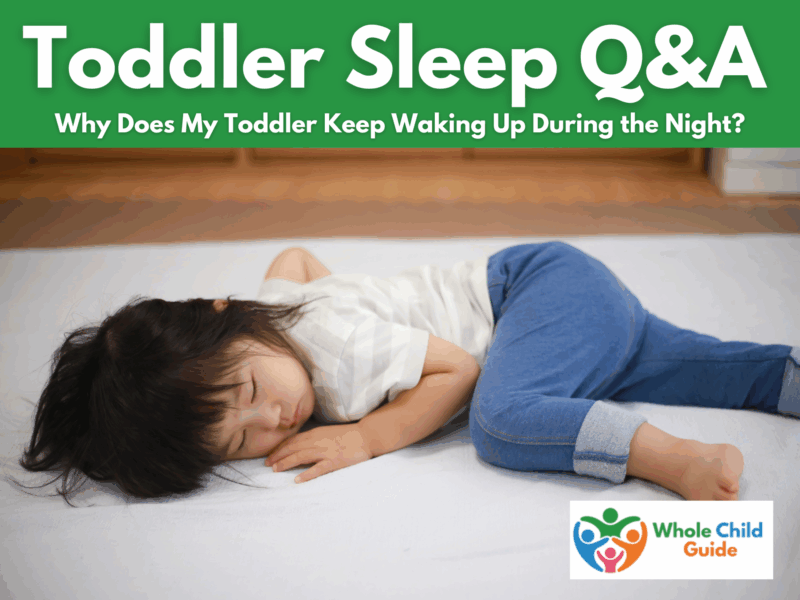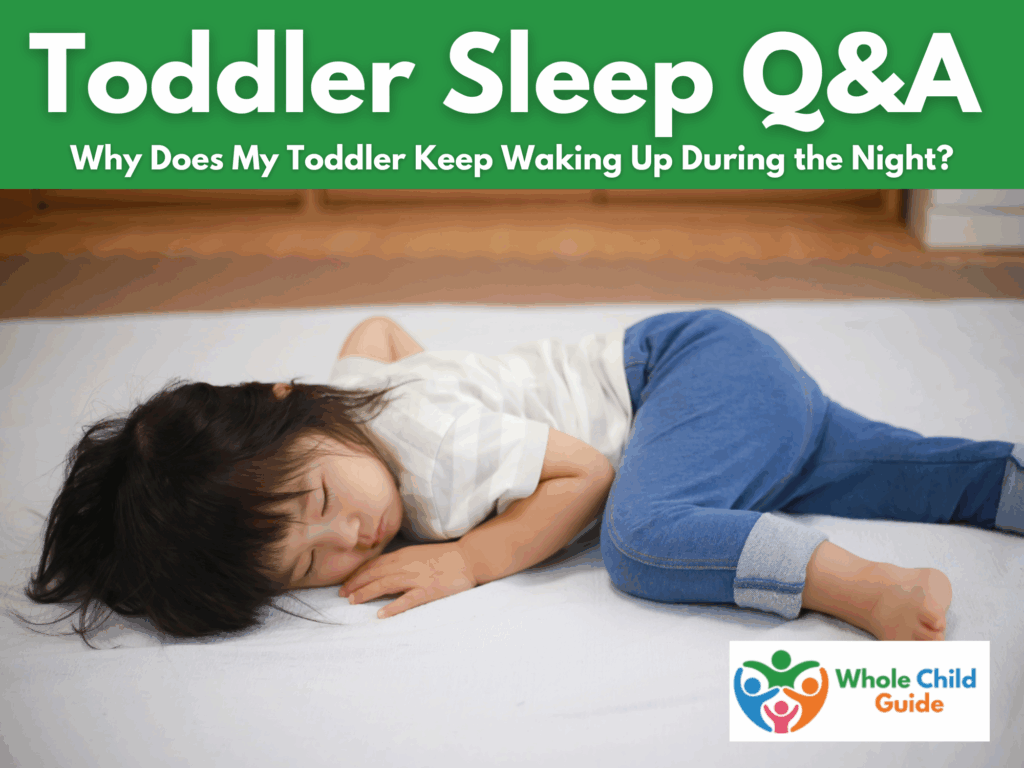
You finally get your toddler to bed, exhale, and start to relax, only to hear the familiar cry: “Mommy! Daddy!” at 1:00 a.m. Sound familiar?
If your toddler keeps waking up during the night, you’re not alone. Frequent night waking is one of the most common sleep struggles parents face between ages one and three.
The good news: these wake-ups usually have an underlying cause, and once you understand the “why,” you can gently guide your child toward more restful sleep. Let’s look at what’s happening through a whole child lens, because sleep depends on more than just tiredness.
Be sure to check out our resource on sleep and the whole child because we cover all aspects of child development related to sleep.

Common Reasons Toddlers Wake at Night
1. Developmental Leaps and Growing Independence
Toddlers are learning new skills constantly, walking, talking, climbing, exploring. These developmental leaps often bring extra mental activity at bedtime, making it harder to settle or stay asleep.
As they grow more independent, toddlers also realize they can call you back. This is a sign of emotional development, not misbehavior.
Try this: Create a calm, predictable bedtime routine that ends with connection, a song, a cuddle, or naming one “happy thing” from the day. (Learn more about how social and emotional development impacts sleep in our Social Skills and Play post.)
Another thing to consider is when to move your child from a crib into a toddler bed. This might have some impact on sleepful nights.
2. Sensory Needs and Regulation
Some toddlers wake because their sensory systems are still learning to regulate. A scratchy tag, noisy fan, or shifting room temperature can all trigger discomfort.
An occupational therapist (OT) can help identify sensory triggers and design bedtime routines that calm the nervous system, like gentle deep-pressure massage, white noise, or weighted blankets (used safely under guidance). Check out our resource on how to support sleep needs with a sensory perspective.
Read more about how OTs approach gentle sleep in our post Should I Let My Baby Cry It Out?.
3. Feeding and Digestion
Feeding routines don’t just affect babies! Toddlers can also experience tummy discomfort, reflux, or hunger overnight. Late snacks high in sugar or dairy sometimes interfere with rest.
A speech therapist (ST) specializing in feeding can help if your child struggles with swallowing, food textures, or slow eating. Check out our post on Feeding and the Whole Child to learn how feeding ties into better sleep.
4. Movement and Physical Comfort
Toddlers who haven’t had enough physical movement during the day may have restless sleep, while others wake because of tight muscles or growing pains.
A physical therapist (PT) can assess whether your child’s posture, flexibility, or motor skills might be impacting comfort at night. PTs can also guide playful daytime activities that help toddlers release energy in healthy ways. This includes balancing games, crawling tunnels, or family walks.
Learn more about what PTs do in our post How Can Physical Therapy Near Me Help?.
5. Communication and Emotional Expression
Toddlers wake for comfort, reassurance, or attention, and that’s normal. As language skills grow, some children need help expressing fear, excitement, or worry instead of crying or calling out.
Speech therapists, counselors, and parent coaches can all help parents build emotional vocabulary: “You were scared when it got dark,” or “You wanted me close.” This supports both communication and regulation.
Explore how communication connects to behavior in our post How Can Speech Therapy Near Me Help?.
6. Transitions, Illness, and Environment Changes
New milestones (potty training, crib-to-bed transitions, travel) or even subtle schedule shifts can disrupt sleep temporarily. Illness, allergies, or ear infections can also cause frequent wakeups.
Tip: Keep bedtime and wake-up times consistent within 30 minutes, even on weekends. Toddlers thrive on routine and predictability.
Gentle Ways to Help Toddlers Sleep Through the Night
One thing is for certain: setting up a routine designed to support the whole child in sleep is essential. Some of the key points are:
- Bedtime routine: 20–30 minutes of calm activities. This might include bath, story, cuddle, lights out.
- Daytime sensory play: climbing, jumping, swinging, pushing heavy toys, or water play to regulate the nervous system.
- Feeding schedule: avoid large snacks right before bed; keep dinner balanced and early.
- Connection before separation: predictable goodnight rituals help toddlers feel secure.
- Parent coaching: a parent coach can help you find a balance between gentle sleep boundaries and family sanity.
When to Seek Professional Help
If you think getting outside help may be a fit for your families needs, consider starting with a sleep specialist.
If your toddler wakes multiple times every night, snores heavily, or seems unusually restless or tired during the day, talk to your pediatrician or a pediatric sleep specialist. Persistent night waking can sometimes signal underlying issues with breathing, reflux, or sensory regulation.
A whole child care team– This can include various professionals like a pediatrician, OT, PT, SLP, or parent coach, who can identify whether the problem is behavioral, sensory, or developmental.
Supporting the Whole Family
Sleep is a family issue, not just a toddler one. When parents are exhausted, everything feels harder, from patience, work, routines, even joy. Finding solutions that honor both your child’s needs and your family’s wellbeing matters most.
If you’re ready to explore gentle, developmentally supportive ways to improve sleep, visit the Whole Child Guide directory to connect with professionals who understand how sleep, regulation, and growth work together. If you are a sleep specialist, check out our resource on finding clients for your sleep training services.

